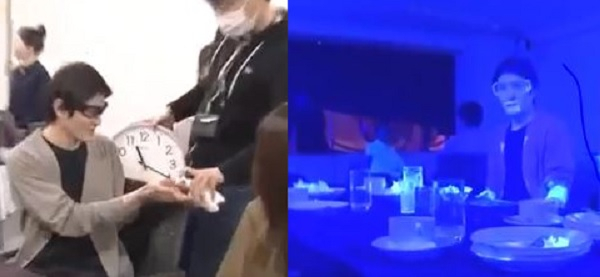
A video of black light experiment shows shocking details of how fast coronavirus can spread in restaurants and cruise ships, especially in a buffet setting. NHK, Japan's public broadcasting organization, released the video of the black light experiment to make people aware of the danger of not following simple rules of social distancing and hand washing when the world is facing coronavirus pandemic.
The Black light experiment
In the experiment taken part by 10 people, a space like that exists in a cruise ship or a restaurant is recreated. Of the 10 people, one represents "infected person" and a fluorescent paint is applied on the infected person named "Patient 0", who coughs while covering his hand to the mouth. The participants are asked to enjoy free buffet for 30 minutes.
The other participants have no idea about the "infected" person eating food amid them. They go about the process and start taking meals from hot to cold dishes including beverages.
After 30 minutes the lights are put off and a black light is emitted to expose where the fluorescent paint (representing virus) has spread. When the video was shown to the participants they were shocked as the paint had spread on the lid covering on a hot food container, a pair of tongs, and the handle of a beverage pitcher. The paint was also visible on other items including silverware, dishes, glassware, clothing and mobile phones. What shocked the most was the paint was also visible on at least three of the other participants apart from the "infected" person.
クルーズ船ã§æ„ŸæŸ“拡大を招ã„ãŸã¨ã•ã‚Œã‚‹æŽ¥è§¦æ„ŸæŸ“ãŒã©ã®ã‚ˆã†ã«ã—ã¦èµ·ãã‚‹ã®ã‹ã€ï¼®ï¼¨ï¼«ãŒå°‚門家ã¨å…±åŒã§å®Ÿé¨“ã‚’è¡Œã£ãŸã¨ã“ã‚ã€ã‚¦ã‚¤ãƒ«ã‚¹ã«è¦‹ç«‹ã¦ãŸå¡—æ–™ã¯å¤šæ•°ã®äººãŒè§¦ã‚‹ã‚‚ã®ã‚’介ã—ã¦åºƒãŒã‚‹ã“ã¨ãŒç¢ºèªã•ã‚Œã¾ã—ãŸã€‚https://t.co/exeyyRXQiD pic.twitter.com/NCHGyJyXRw
— NHKニュース (@nhk_news) May 8, 2020
This shows why social distancing is important and more than that health experts say hand washing is the primary tool that can keep the virus away. This was proved by black light experiment in the same scenario with the simple rule followed.
Alternate experiment, shocking result
In an alternate experiment 10 participants were asked to eat buffet meal but dishes were separated, tongs were replaced frequently and participants were told to wash their hands frequently. The "infected" person washed his hand first, followed by the participants before touching utensils or after finishing and before going for second serving.
After 30 minutes when the lights were put off and black light emitted, shockingly the invisible paint was spread at least 97 percent less than in the experiment where the rule of hand washing was not followed.
Moreover no paint was found on the faces of any other participants. This proves how important is washing hands and following the rules of hygiene in containing COVID-19.








